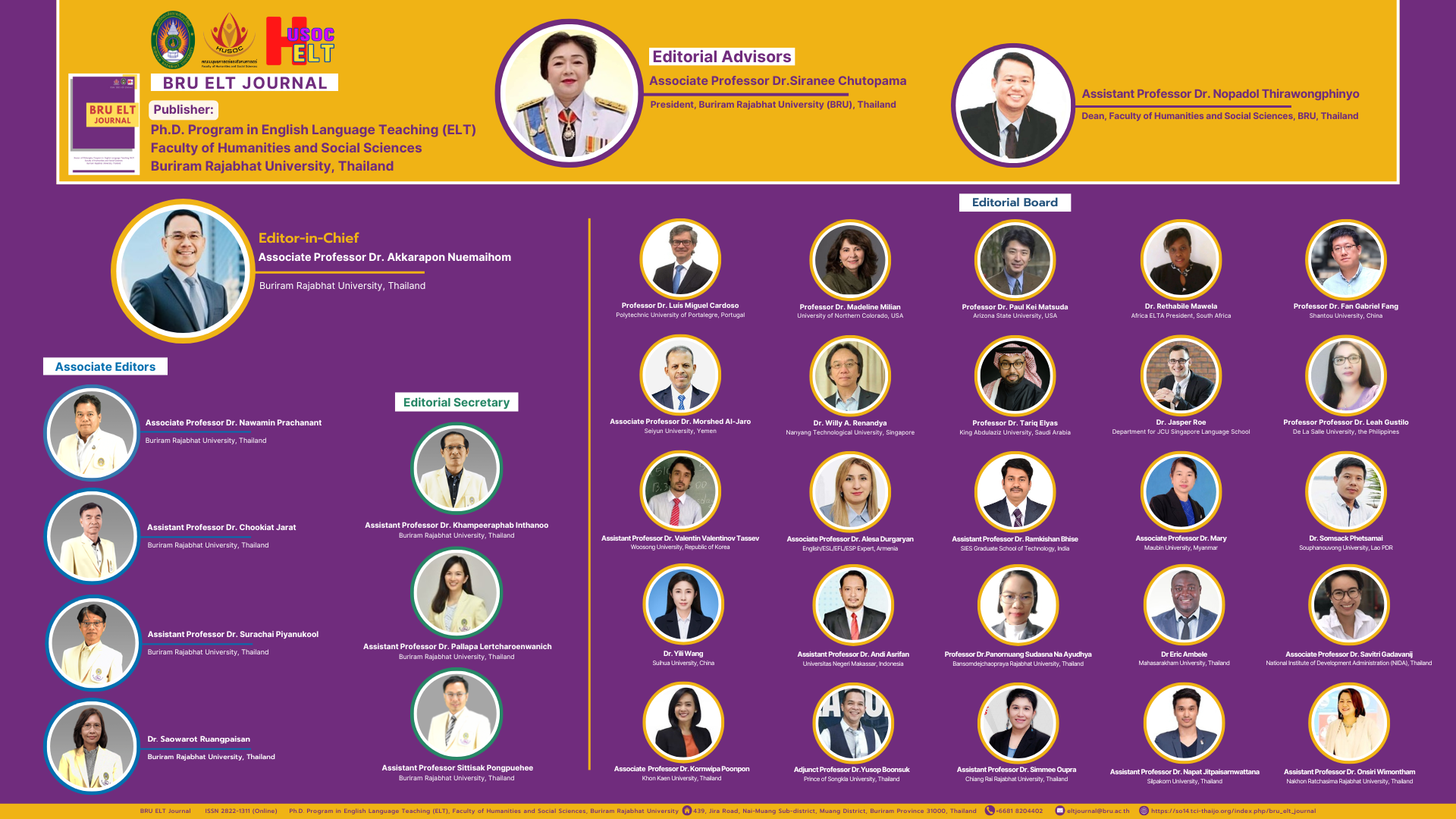Improving Grade 8 Struggling Readers’ Reading Comprehension Skills through Game-based Learning and Teacher-directed Instruction
DOI:
https://doi.org/10.14456/bej.2023.20Keywords:
teacher-directed instruction, game-based learning, reading comprehension skill, struggling readersAbstract
The ability to comprehend written material is critical for individuals as it empowers them to accurately interpret and evaluate it, so it is important to facilitate the development of this skill among the learners. The purpose of this research was to determine the effectiveness of Game-Based Learning and Teacher-Directed Instruction in improving the reading comprehension skills of the eighth-grader Struggling readers in a public school in Kinoguitan, Misamis Oriental, Philippines. This study utilized the quasi-experimental design with the use of the teacher-made questionnaire to evaluate the reading comprehension levels of both groups prior to and subsequent to the interventions. Descriptive statistics were used to present results, T-test for paired samples was used to determine significant differences in the two groups, and the T-test for independent samples was used to determine significant differences in the two groups’ reading comprehension increments. The findings demonstrate that Game-Based Learning is more effective than Teacher-Directed Instruction. In order to effectively enhance reading comprehension, the research suggests that instructional approaches incorporate interactive and engaging activities as well as structured and explicit approaches as this foster active cognitive involvement and reinforce fundamental comprehension strategies.
References
Abame, A., Biraga, M., Abe, T., & Fantu, S. (2017). Improving reading comprehension through extensive reading: The case of WCU 2nd year English majoring students. International Journal of Research, 4(1).
Arivuchelvan, K.M., & Lakahmi, K. (2017). Reading comprehension system – A review.
Bondaug, K. M. (2021). Game-based learning material for developing reading Comprehension. Asia Pacific Journal of Social and Behavioral Sciences, 19, 23-38.
Chang, C. C., Warden, C. A., Liang, C., & Lin, G. Y. (2018). Effects of digital game-based learning on achievement, flow and overall cognitive load. Australasian Journal of Educational Technology, 34(4).
Dimitra, K., Konstantinos, K., Christina, Z., & Katerina, T. (2020). Types of game-based learning in education: A brief state of the art and the implementation in greece. European Educational Researcher, 3(2), 87-100.
Dixon, D., Dixon, T. O., & Jordan, E. (2022). Second language (L2) gains through digital game-based language learning (DGBLL): A meta-analysis. Language Learning & Technology, 26(1), 1–25. http://hdl.handle.net/10125/73464
Dugasa, G., Olana, T., & Ali, S. (2022). Effects of explicit reading strategy instruction on grade 9 students’ achievement in reading comprehension. Education Research International, 2022.
Dwiningtiyas, G. N., Sofyan, D., & Puspita, H. (2020). Teachers’ strategies in teaching reading comprehension. Journal of Applied Linguistic and Literacy, 4(2), 66-77.
Ebrahimzadeh, M., & Sepideh, A. (2017). The effect of digital video games on EFL students’ language learning motivation. Teaching English with Technology, 17(2), 87-112.
Elleman, A. M., & Oslund, E. L. (2019). Reading comprehension research: Implications for practice and policy. Policy insights from the behavioral and brain sciences, 6(1), 3-11.
Eppley, K., & Dudley-Marling, C. (2019). Does direct instruction work?: A critical assessment of direct instruction research and its theoretical perspective. Journal of Curriculum and Pedagogy, 16(1), 35-54.
Fotaris, P., Pellas, N., Kazanidis, I., & Smith, P. (2017, October). A systematic review of augmented reality game-based applications in primary education. In Memorias del xi congreso europeo en aprendizaje basado en el juego graz (pp. 181-191).
Frampton, S. E., Munk, G. T., Shillingsburg, L. A., & Shillingsburg, M. A. (2021). A systematic review and quality appraisal of applications of direct instruction with children with Autism Spectrum Disorder. Perspectives on Behavior Science, 44, 245-266.
Gatcho, A. R. G., & Hajan, B. H. (2019). Augmenting senior secondary ESL learners' reading skills through explicit instruction of metacognitive strategies. Online Submission, 6(1), 1-23.
Gilakjani, A., & Sabouri, N. B. (2016). How can students improve their reading comprehension skill. Journal of Studies in Education, 6(2), 229.
Hartt, M., Hosseini, H., & Mostafapour, M. (2020). Game on: Exploring the effectiveness of game-based learning. Planning Practice & Research, 35(5), 589-604.
Head, C. N., Flores, M. M., & Shippen, M. E. (2018). Effects of teacher-directed instruction on reading comprehension for individuals with autism or developmental disabilities. Education and training in autism and developmental disabilities, 53(2), 176-191.
Hertati, E., & Asrowi, D. T. A. (2022). Android-based social science educational game media in elementary schools: The Effect of media on student learning outcomes. International Journal of Social Science and Human Research, 5(06).
Hung, H. T., Yang, J. C., Hwang, G. J., Chu, H. C., & Wang, C. C. (2018). A scoping review of research on digital game-based language learning. Computers & Education, 126, 89-104.
Jones-Carey, M. H. (2013). Direct reading instruction and the NYS ELA (Doctoral dissertation, D'Youville College).
Loopoo, V., & Balfour, R. (2021). Improving reading strategies and assessments used by educators to enhance learner academic success. Per Linguam, 37(1), 1-14.
Maandig, R.B., Lomibao, L.S., & Luna, C.A. (2017). Structured content reading instruction vs. teacher-directed instruction: Their implication on students’ achievement, reading comprehension and critical thinking in mathematics. American Journal of Educational Research, 5, 574-578.
Marsa, S. S., Kuspiyah, H. R., & Agustina, E. (2021). The effect of Kahoot! game to teaching reading comprehension achievement. Journal of English teaching, 7(2), 133-149.
Molin, G. (2017). The role of the teacher in game-based learning: A review and outlook. Serious Games and Edutainment Applications: Volume II, 649-674.
Nanda, D. W., & Azmy, K. (2020). Poor reading comprehension issue in EFL classroom among Indonesian secondary school students: Scrutinizing the causes, impacts and possible solutions. Englisia: Journal of Language, Education, and Humanities, 8(1), 12-24.
Nuraeni, N., & Aisyah, S. (2022). Contextualisation of direct instruction method in teaching reading comprehension skills: The literature review. SELTICS, 5(1), 43-50. https://doi.org/10.46918/seltics.v5i1.1401
Okkinga, M. (2018). Teaching reading strategies in classrooms: does it work?. University of Twente. https://doi.org/10.3990/1.9789036544481
Papadakis, S. (2018). The use of computer games in classroom environment. International Journal of Teaching and Case Studies, 9(1), 1-25.
Pinto, M., & Ferreira, P. D. (2018). Use of videogames in higher education in Portugal: A literature review. Challenges 2017: Aprender nas nuvens, Learning in the clouds.
PISA (2018). Program for International Student Assessment. https://www.oecd.org/Pisa/Combined_Executive_Summaries_PISA_2018.Pdf
Purgina, M., Mozgovoy, M., & Blake, J. (2020). WordBricks: Mobile technology and visual grammar formalism for gamification of natural language grammar acquisition. Journal of Educational Computing Research, 58(1), 126-159.
Ronimus, M., Kujala, J., Tolvanen, A., & Lyytinen, H. (2014). Children's engagement during digital game-based learning of reading: The effects of time, rewards, and challenge. Computers & Education, 71, 237-246.
Sa’adah, N., Maylawati, D. S. A., Sumardi, D., & Syah, M. (2018). Teachers’ cognition about teaching reading strategies and their classroom practices. In 2nd International Conference on Sociology Education - Volume 2: ICSE, pages 29-35. DOI: 10.5220/0007103906690675
Shi, A., Wang, Y., & Ding, N. (2022). The effect of game–based immersive virtual reality learning environment on learning outcomes: designing an intrinsic integrated educational game for pre–class learning. Interactive Learning Environments, 30(4), 721-734.
UNICEF. (2021). The state of the global education crisis: A path to recovery: A joint UNESCO, UNICEF and WORLD BANK report.
Verdadero, J. S. (2020). English quarter 2- module 3: Comparing and contrasting different multimodal texts (1st ed.). Department of Education, SOCCSKSARGEN Region.
Williyam, A., Yunus, M. M., & Aziz, A. A. (2016). Students’ perception of using games in the teaching of reading skill. In International Conference on Education: Education In The 21st Century: Responding To Current Issues (pp. 100-104).
Witt, S. (2018). Effectiveness of teacher-directed instruction on struggling readers.
Yaghmour, K. S., & Obaidat, L. T. (2022). The effectiveness of using direct instruction in teaching comprehension skill of third-grade students. International Journal of Instruction, 15(2), 373-392.
Yurko, N., & Protsenko, U. (2020). Reading comprehension: the significance, features and strategies. Publishing house «European Scientific Platform», 106-114.
Żammit, J. (2021). A verbal odyssey. GRIN Verlag.
Żammit, J. (2021). Maltese as a second language learning challenges and suggested teaching strategies. Malta Review of Educational Research, 15(2), 197-220
Żammit, J. (2022). Is mobile game-based learning effective for international adults learning Maltese?. Asian-Pacific Journal of Second and Foreign Language Education, 29(7), 1-18






